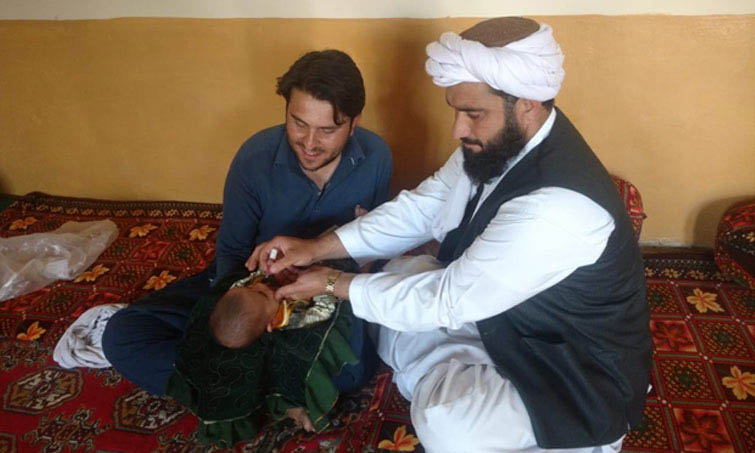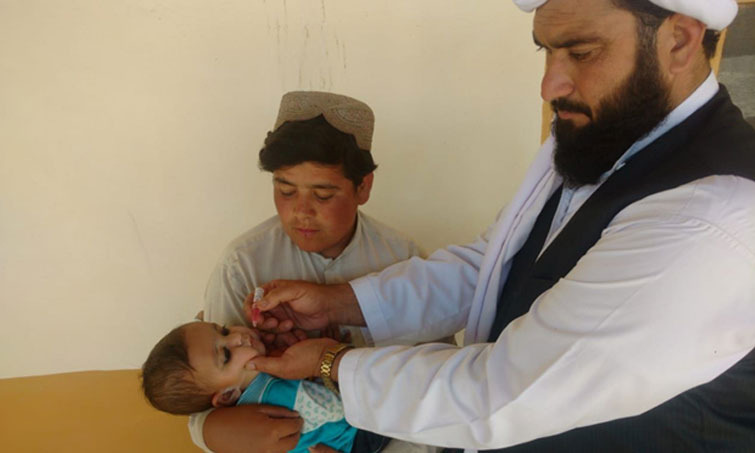How a vaccine refuser became an advocate for polio eradication
Molvi Hameedullah Hameedi is a prominent religious scholar in a mountainous rural area of Killa Abdullah district in Balochistan province, Pakistan. Bordered by Afghanistan in the north and west, Killa Abdullah is one of the remotest and poorest districts of Balochistan with the vast majority of the population being Pashtuns. Molvi Hameedullah has a close connection to his community, delivering the sermon each week during Friday prayers, and running a seminary.

He is also a determined supporter of routine vaccination for all children, and an advocate for better health.
This might come as a surprise if you knew Molvi Hameedullah just a year or two ago. For most of his life, he did not believe in the safety and effectiveness of the oral polio vaccine, the key tool of polio eradication, which has helped reduce incidence of the virus by over 99.9% worldwide.
Reflecting on his changed beliefs as he takes a break from vaccinating children during the July campaign, he remembers the conviction with which he held his anti-vaccination stance, and the challenge he was presented with.
“I was a religious scholar who was very skeptical of non-governmental organizations and the polio vaccine. I had always supported the anti-vaccination stance of some of the religious leaders around me.”
“After reading anti-vaccine books and papers, I began following the work of anti-vaccine campaigners. Soon, I came to consider it my religious duty to spread awareness against the polio vaccine.”
“But it all changed when I was invited to a two-day International Ulema conference in Islamabad where religious scholars from all over Pakistan and other Islamic countries were invited to debate polio vaccination.”

The conference Molvi Hameedullah attended was hosted by the Islamic Advisory Group for Polio Eradication (IAG). The IAG was launched in 2014 by leading Islamic institutions including Al-Azhar University as its Secretariat, the International Islamic Fiqh Academy (IIFA), the Islamic Development Bank (IsDB) and the Organization of Islamic Cooperation (OIC). It comprises religious scholars including Imam-e-Kaaba as well as other prominent experts and academics from the Muslim world, working together to bolster global efforts to end polio for good.
In Pakistan, where poliovirus transmission has never been interrupted, the national IAG (NIAG) carries out important work to build a large network of vaccine-supporting religious individuals, trusted in their respective communities, who will support vaccination activities in their districts.
For Molvi Hameedullah, it was a revelatory moment. “At the conference, I was given an opportunity to discuss my apprehensions towards polio vaccine. The talks I had motivated me to further research the pro-polio vaccine stance, and I started meeting with religious scholars in Karachi to debate polio vaccination."
“Through talking to these people, I was getting a completely different picture to what I had believed earlier.”
By educating religious leaders and scholars about the poliovirus, and explaining religious justifications for vaccine acceptance, the IAG and NIAG equips people like Molvi Hameedullah with the tools to act as health advocates, both during and outside of polio vaccination campaigns. The same skills that help scholars engage with parents about the polio vaccine are applicable for wider health, including routine immunization, hygiene practices, and maternal and child health. The religious support network with its expanded mandate in Pakistan has played an important role in building trust and demand for other immunization and mother and child health programs at community level.
After the conference Molvi Hameedullah was offered support by other vaccine-promoting scholars.
“I received a book from a religious support person working for polio vaccination in my area. It was definitely a turning point for me. Included were dozens of fatwas from highly esteemed madrassahs and religious teachers. I was initially skeptical, so I telephoned the madrassahs who had written them. To my surprise, all the fatwas were genuinely issued by them, and they also urged me to support vaccination wherever I called.”
Today, Molvi Hameedullah teaches similar fatwas as a member of the Provincial Scholar Task Force under the NIAG. The majority of the Provincial Scholar Task Force members are honorary members and are not being paid salary, instead, the local government facilitates their transport and communication during immunization campaigns. Of his new role Molvi Hameedullah says, “All my doubts vanished, but I was faced with a different problem. I had been working against polio vaccination for many years, and now felt that I had done a great damage to the children and parents of my community. I felt it was now my absolute religious duty to negate all that I had taught before. I decided to step forth, and started working in the community voluntarily to promote vaccination.”
Since he joined the Provincial Scholars Task Force, religious refusals in Molvi Hameedullah’s area have declined. He has also begun supporting other ways of ensuring that every child receives a vaccine, including by recruiting women vaccinators.
He acknowledges that the work he does now is not easy. He and his fellow scholars sometimes face challenges from those accusing them of having a political agenda, and changing beliefs informed by years of cultural and religious tradition takes time and patience. But he vows to continue his new mission until the eradication.
